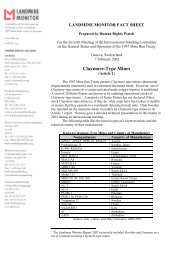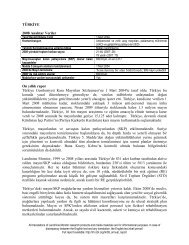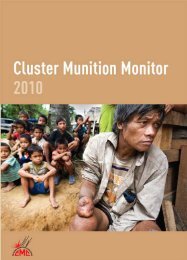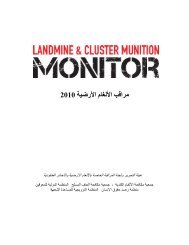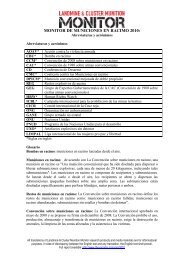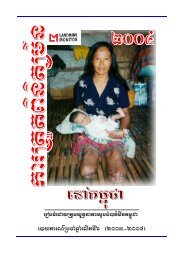Download PDF - Landmine and Cluster Munition Monitor
Download PDF - Landmine and Cluster Munition Monitor
Download PDF - Landmine and Cluster Munition Monitor
You also want an ePaper? Increase the reach of your titles
YUMPU automatically turns print PDFs into web optimized ePapers that Google loves.
<strong>Cluster</strong> <strong>Munition</strong> <strong>Monitor</strong> 2012<br />
Yet, as of 31 July 2012, 32 of the 75 States Parties to the Convention on <strong>Cluster</strong> <strong>Munition</strong>s still had not declared their<br />
views on even one of the interpretive issues listed above. 190<br />
In addition, US Department of State cables made public by Wikileaks in late 2010 <strong>and</strong> 2011 show how the US, despite<br />
not itself participating in the Oslo Process, has attempted to influence its allies, partners <strong>and</strong> other states on the content<br />
of the Convention on <strong>Cluster</strong> <strong>Munition</strong>s, especially with respect to interoperability. 191 The cables also show that the US<br />
has stockpiled <strong>and</strong> may continue to be storing cluster munitions in a number of States Parties, including Afghanistan,<br />
Germany, Italy, Japan, <strong>and</strong> Spain. US cluster munition stocks have been removed from Norway <strong>and</strong> the UK.<br />
Prohibition on assistance <strong>and</strong> interoperability<br />
Article 1 of the convention obliges States Parties “never under any circumstances to…assist, encourage or induce anyone<br />
to engage in any activity prohibited to a State Party under this Convention.” Yet during the Oslo Process, some states<br />
expressed concern about the application of the prohibition on assistance during joint military operations with countries<br />
that have not joined the convention. In response to these “interoperability” concerns, Article 21 on “Relations with States<br />
not Party to this Convention” was included in the convention. Article 21 was strongly criticized by the CMC for being<br />
politically motivated <strong>and</strong> for leaving a degree of ambiguity about how the prohibition on assistance would be applied in<br />
joint military operations.<br />
Article 21 says that States Parties “may engage in military cooperation <strong>and</strong> operations with States not party to this<br />
Convention that might engage in activities prohibited to a State Party.” It does not, however, negate a State Party’s<br />
obligations under Article 1 to “never under any circumstances” assist with prohibited acts. The article also requires States<br />
Parties to discourage use of cluster munitions by those not party <strong>and</strong> to encourage them to join the convention. Together,<br />
Article 1 <strong>and</strong> Article 21 should have a unified <strong>and</strong> coherent purpose, as the convention cannot both discourage the use<br />
of cluster munitions <strong>and</strong>, by implication, encourage it. Furthermore, to interpret Article 21 as qualifying Article 1 would<br />
run counter to the object <strong>and</strong> purpose of the convention, which is to eliminate cluster munitions <strong>and</strong> the harm they cause<br />
to civilians.<br />
The CMC position is therefore that States Parties must not intentionally or deliberately assist, induce, or encourage<br />
any activity prohibited under the Convention on <strong>Cluster</strong> <strong>Munition</strong>s, even when engaging in joint operations with states<br />
not party.<br />
At least 35 States Parties <strong>and</strong> signatories have agreed that the convention’s Article 21 provision on interoperability<br />
should not be read as allowing states to avoid their specific obligation under Article 1 to prohibit assistance with prohibited<br />
acts. 192 This includes 28 States Parties <strong>and</strong> signatories that have previously stated their agreement with this view <strong>and</strong><br />
seven more States Parties <strong>and</strong> signatories that confirmed this view in the reporting period:<br />
• Burundi informed the <strong>Monitor</strong> in March 2012 that it considers assistance with prohibited acts in joint military<br />
operations to be prohibited by the convention. 193<br />
• Cameroon’s Ministry for External Relations stated in May 2011 that, among other prohibitions, it “approves”<br />
the prohibition on the assistance in joint military operations. 194<br />
• A Chilean Ministry of Defense official informed the <strong>Monitor</strong> in April 2012 that Article 21 does not prevent<br />
Chile from conducting military training exercises with states not party to the convention, but emphasized that<br />
Chile would require that states participating in exercises do not use cluster munitions via a written order sent<br />
to officials involved in exercises. 195<br />
• The Czech Republic stated in an April 2012 letter to the <strong>Monitor</strong> that it considers that assistance with prohibited<br />
acts in joint military operations prohibited under the convention <strong>and</strong> any assistance with non-States<br />
Parties during joint operations “shall not go beyond Article 21 together with Article 1 of the Convention.” 196<br />
190<br />
States Parties that have not publicly expressed a view on any of these interpretive issues include: Afghanistan, Albania, Antigua <strong>and</strong> Barbuda,<br />
Botswana, Cape Verde, Cook Isl<strong>and</strong>s, Costa Rica, Côte d’Ivoire, Dominican Republic, El Salvador, Fiji, Guinea-Bissau, Honduras, Lesotho,<br />
Lithuania, Mauritania, Moldova, Monaco, Mozambique, Niger, Panama, Saint Vincent <strong>and</strong> the Grenadines, Samoa, San Marino, Seychelles,<br />
Sierra Leone, Swazil<strong>and</strong>, Trinidad <strong>and</strong> Tobago, Togo, Tunisia, <strong>and</strong> Uruguay.<br />
191<br />
As of July 2012, Wikileaks had made public a total of 428 cables relating to cluster munitions originating from 100 locations for the period<br />
from 2003 to 2010. Previously, <strong>Cluster</strong> <strong>Munition</strong> <strong>Monitor</strong> 2011 had reviewed cables released by Wikileaks as of early August 2011, a<br />
total of 57 US diplomatic cables from 24 locations. See http://www.cablegatesearch.net/search.phpq=cluster+munitions&qo=0&qc=0&q<br />
to=2010-02-28.<br />
192<br />
At least 28 States Parties <strong>and</strong> signatories have previously stated their agreement with this view: Austria, Belgium, BiH, Bulgaria, Colombia,<br />
Croatia, Ecuador, France, Ghana, Guatemala, Holy See, Hungary, Icel<strong>and</strong>, Irel<strong>and</strong>, Lao PDR, Lebanon, Madagascar, Malawi, Mali, Mexico,<br />
Montenegro, New Zeal<strong>and</strong>, Nicaragua, Norway, Portugal, Slovenia, Sweden, <strong>and</strong> Switzerl<strong>and</strong>. See CMC, <strong>Cluster</strong> <strong>Munition</strong> <strong>Monitor</strong> 2011<br />
(Ottawa: Mines Action Canada, October 2011), pp. 25-27; ICBL, <strong>Cluster</strong> <strong>Munition</strong> <strong>Monitor</strong> 2010 (Ottawa: Mines Action Canada, October<br />
2010), pp. 20–21; <strong>and</strong> Human Rights Watch <strong>and</strong> <strong>L<strong>and</strong>mine</strong> Action, Banning <strong>Cluster</strong> <strong>Munition</strong>s: Government Policy <strong>and</strong> Practice (Ottawa:<br />
Mines Action Canada, May 2009), pp. 25–26.<br />
193<br />
Response to <strong>Monitor</strong> questionnaire from Denis Gahiru, Director General, Civil Protection <strong>and</strong> Humanitarian Action Against Mines <strong>and</strong><br />
Explosive Remnants of War, Ministry of Public Security, 20 March 2012.<br />
194<br />
Translation by the <strong>Monitor</strong>. “Cameroon <strong>and</strong> the Convention on <strong>Cluster</strong> <strong>Munition</strong>s,” statement provided to H<strong>and</strong>icap International in email<br />
from Dr Yves Alex<strong>and</strong>re Chouala, Head of Agreements <strong>and</strong> Conventions Unit, Ministry of External Relations, 12 May 2011.<br />
195<br />
Interview with Luis Doñas, Director of International Treaties, Ministry of Defense, Santiago, 20 April 2012.<br />
196<br />
Letter from Miroslav Klíma, UN Director, Ministry of Foreign Affairs, to Mary Wareham, Senior Advisor, Human Rights Watch, REF: no.<br />
102870-2/2012-OSN, 30 April 2012.<br />
34



